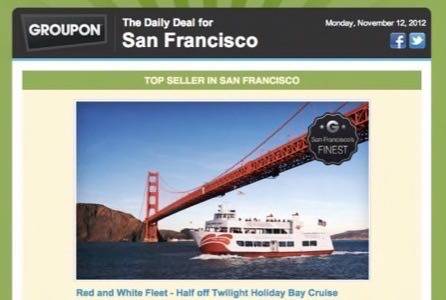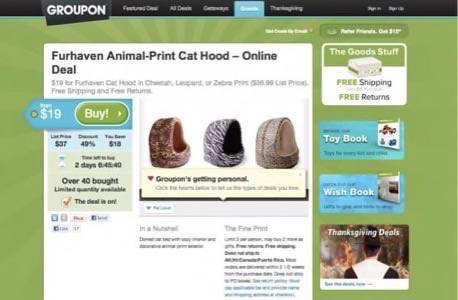
After losing 90% of its value from its IPO heyday, daily deals guru Groupon is looking more and more like one of its own deep discount coupons.
Founded in 2008, Groupon went public last fall among 2011’s flurry of IPOs from hot-to-trot tech companies like LinkedIn and Skype. Now, the company’s stock is tumbling after it failed to meet analyst expectations for the third quarter of 2012.
After already reaching an all-time low last week, Groupon is now trading at a rock-bottom $2.69 — a plummet from its early November valuation that hovered around $4.00 a share and an absolute nosedive from its $28-per-share opening price one year ago.
The company also recently laid off 80 sales employees “as part of an effort to automate the way it handles its deals,” according to The New York Times. They’ve cut 648 in the past six months. Yikes.
In 2010, Groupon turned up its nose at a whopping $6 billion offer from Google. If Groupon had gone along for the ride, it would have made history as Google’s second largest acquisition ever at about half of the $12.5 billion Motorola buy and over three times as much as the price Google paid for YouTube back in 2006.
Instead the company stayed the course, insisting on remaining independent and confident that it could continue raking in a rumored $2 billion in annual revenue. Talk about seller’s remorse.

Is There A Daily Deals Bubble?
Ask anyone who’s opted out of email alerts for half-price spa days and dinners for two: daily deals served up to your inbox every day can get old — and fast. Most of tech blogging’s upper echelons have already made a case that the daily deals phenomenon is a fad that’ll come and go with the speed of a limited time Groupon offer, and we’re inclined to agree.
Indeed the daily deals space boasts all the trappings of a true tech mini-bubble, from 2010’s sky-high early valuation to today’s ringing silence where there once was the clamor of companies scrambling to get a piece of the half-off pie. With the buzz waning, Groupon and its ilk (Living Social, Google Offers) have become little more than a fly buzzing around your inbox — and swatting it away is as easy as clicking unsubscribe.
The ultimate sign your business model might have jumped the shark? There’s a startup that exists solely to help people get the hell away from your product.
Toss systemic daily deals fatigue on a heap of flaws ranging from understandably disgruntled vendors screwed over by the Groupon model to a green CEO prone to YouTubing naked yoga sessions — and making stockholders squirm — and you’ve got yourself a hard sell.
The demise of Groupon isn’t hard to imagine. As our own Cormac Foster wrote a few months ago when Groupon made our Death Watch list:
“Ultimately, it’s likely to become the biggest fish in a much less important pond. It could easily end up as no more than an obscure division of some much larger, more diversified company.”
Groupon’s Euro-Problem
Groupon’s problems arguably run as deep as its business model, but last week CEO Andrew Mason blamed the company’s poor performance in Europe — and the European debt crisis — for its woebegone earnings report.
“We followed a different playbook in Europe, focusing on rapidly capturing market share at the cost of investing in technology and innovation and, too often, the satisfaction of our merchants and customers. With a weak European economy, we didn’t have the necessary runway to integrate our international business before reaching a plateau in growth earlier this year,” Mason said.

Can Groupon Sell Itself Again?
Groupon might be flatlining, but it’s not quite dead yet. The company did recently expand into new-ish territory with Groupon Goods, a Woot-like version of its extant group buying model that serves up deeply discounted products (Yoga leggings! Microfiber duvets! Facelift cream!) rather than less stuff-like stuff.
Just today Groupon announced free shipping and returns for any items bought through Groupon Goods — not a bad little holiday season incentive. Groupon is also gunning for Square with a mobile payments system for local vendors that promises to be cheaper than the competition.
According to Foster, “If Mason can find new ways to leverage these assets across other products and services (for example, cross-selling full-priced flights or shore excursions at the point of purchase for a discounted cruise), it could build out a convenience-based commerce system and open up new partnership opportunities and compensation structures. If it sticks to online couponing, though, right now is probably as good as things will ever get.”
In other words, let the Groupon fire sale commence.
















